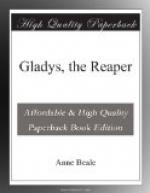‘But surely you will not go away again?’ said Mr Gwynne.
’I am not rich enough to keep up the old place as it ought to be kept, and the debts are not half wiped off yet, so I don’t mean to settle down at present.’
’But a little economy and that sort of thing would soon clear the property. You had better settle down.’
’I don’t think I should like it; besides, I hear there are negotiations going on between my attorneys and some other persons for a fresh tenant.’
The luncheon-bell rang, and the party went into the dining-room; and whilst they are eating and talking we will examine the new comer.
He is decidedly a handsome man. The most fastidious judge of masculine beauty could scarcely deny this fact. Tall, well made, of commanding figure and aristocratic appearance, black hair, a high rather than a broad forehead, well marked eyebrows, and black lashes so long that they half conceal the grey eyes beneath; an aquiline nose, and a well-defined mouth, with an expression slightly sarcastic; a chin so deeply indented with a dimple that, if the old saw be true, he must be a flirt or a deceiver; and withal, a manner so perfectly easy and self-possessed that you say at once court, camp, or cottage must be equally accessible to that man.
There is a certain power in him that even a reader of character would scarcely understand for some time. Is it intellect? There is decidedly intelligence in the face, yet it is not highly intellectual; there are no disfiguring lines and cross lines, the furrows of study or thought. Is it mere health and animal spirits? He is neither particularly rosy nor overpoweringly cheerful. Does he read your mind at a glance? His eyes are penetrating, but not uncomfortably so. It is, we are inclined to think, that general and instinctive knowledge of the characters and tendencies of those with whom he converses, which commerce with the world, and a keen observation of men and manners, alone can give. He is, in short, a man of the world.
When he first entered the army his father and an elder brother were alive. They, dying about three years after, left him in possession of a large but greatly encumbered property. It was estimated that it would take twenty years at least to clear the estate, and that only by letting it and never drawing upon the proceeds.
The young heir was wise enough to retain his post as officer in Her Majesty’s service, though not to sequester all his income for the payment of his father’s, grandfather’s, and great-grandfather’s debts or mortgages. He spent about a fourth of it annually, and consequently the property was still greatly encumbered and he knew that to reside on it and clear it he would be obliged to live in a very humdrum style, or else add to the burden of debt already incurred. He preferred, remaining in the army, and being a general favourite in society, and having no near relations in Wales, it never occurred to him to spend his furloughs in his native county. He had always some distant land to visit, and either with his regiment or on leave had travelled nearly all over the world.




